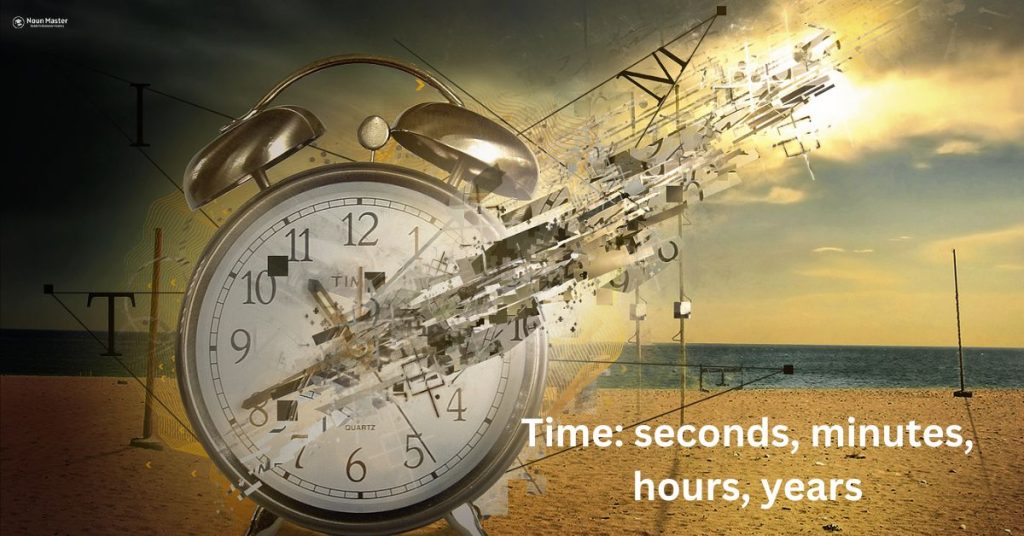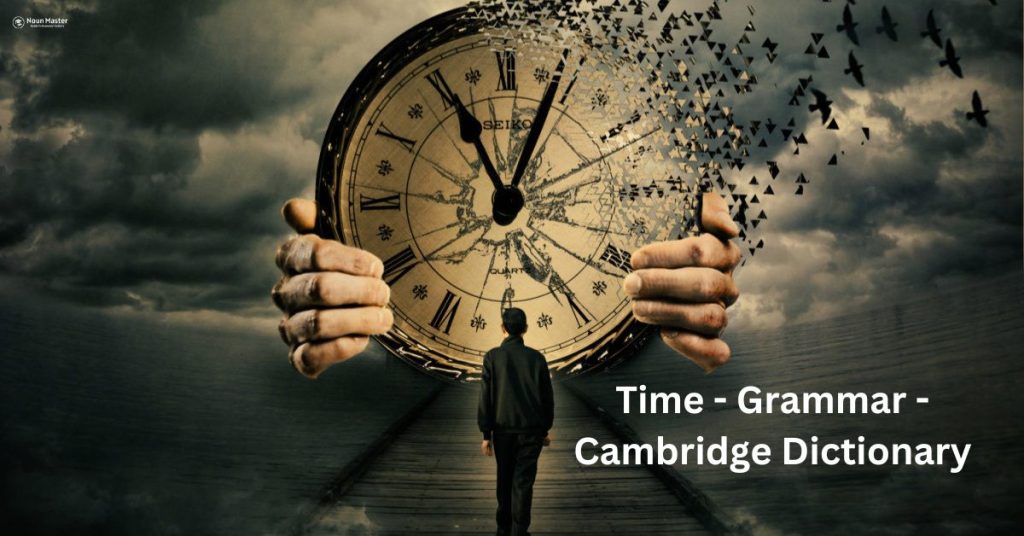Time – Grammar is an important aspect of English, helping us express hours, minutes, and even past or future events clearly. Whether you’re talking about a specific moment or describing an event, understanding Time – Grammar ensures that your message is clear and precise. From talking about the exact time to referencing moments in history, time expressions are essential in everyday conversation.
In Time – Grammar, we learn how to say times like “It’s 3:00,” “It’s 10:15,” or “We’ll meet at 5 o’clock.” We also use expressions like “in time,” “on time,” and “just in time” to discuss punctuality. When talking about past events, we might use phrases like “the time when” or “once upon a time.” Whether it’s telling the time on a clock or talking about past experiences, mastering time-related grammar helps us communicate better. Learning these rules makes it easy to express time naturally and effectively in English.
Time: seconds, minutes, hours, years

We use time to talk about clock time when referring to specific hours, minutes, or seconds in a day. In this sense, it is uncountable:
What time does the meeting start?
She didn’t have time to finish her assignment.
Not: She didn’t have time to finish her assignment.
In some expressions, time is countable:
I have been to Paris three times.
There was a time when people used candles instead of electric lights.
We also use time to refer to calendar time, which includes days, months, and years. In this sense, it is uncountable:
Time moves quickly when you’re having fun.
He spent a lot of time studying for the exam.
Not: He spent a lot of time studying for the exam.
In other cases, time is countable:
It was a difficult time in her life.
This is an exciting time of year for sports fans.
Time: talking about clock or calendar time

When we talk about specific clock times, time is countable. We do not use hour in these cases:
What time is it now?
Not: What hour is it?
Is this a bad time to call?
The train arrives at that time every day.
Not: … at that hour.
We use in …’s time to indicate when something will happen in the future:
She’ll be back in an hour’s time.
We’re moving to a new house in two months’ time.
Not: … in two months time.
See also:
[At, on, and in (time)]
[Telling the time]
Read More: OPPS Word Meaning, Uses, and Examples
On time and in time
We use time to talk about scheduled or timetabled events. If something happens on time, it means it occurs at the exact planned moment, neither early nor late. For emphasis, we can use right on time, or more informally, dead on time or bang on time:
The 7:30 bus always leaves on time. (It departs exactly as scheduled.)
The concert started right on time, which was surprising.
A: The meeting is at 3:00. Will everyone be there?
B: Hopefully, but they rarely start on time.
We use time to indicate that we are not late and have enough time to do something. It is often used with for + noun or with a verb in the to-infinitive form:
We arrived in time for the opening speech. (We were early enough to hear it.)
She ran all the way and got to the station in time to catch the last train.
For emphasis, we use just in time when something happens at the last possible moment before it is too late:
I made it to the airport just in time my flight was about to board!
You’re just in time for dinner!
Time: referring to past events
We often use expressions with time to refer to past events, such as the time, the time that, and the time when. These expressions help us recall specific moments or occurrences:
Remember the time we went to the beach and it started raining?
I’ll never forget the time that we all got lost in the city on our vacation.
One time when I was at the market, I ran into an old friend from school.
Children’s stories often start with the phrase Once upon a time, which introduces a fairy tale or event from long ago:
Once upon a time, there was a young prince who lived in a castle.
These expressions allow us to look back at memorable events or stories from the past, adding a sense of nostalgia or intrigue.
Telling the time

When we talk about telling the time, we generally refer to the hours and minutes displayed on a clock or watch. There are several common ways to express time in English, depending on whether we’re using a 12-hour or 24-hour clock.
For 12-hour time, we often say the hours and minutes, followed by AM or PM to distinguish between morning and afternoon times:
- It’s 3:15 PM. (In the afternoon)
- It’s 7:30 AM. (In the morning)
We also use expressions like o’clock to refer to the exact hour, especially in more formal contexts:
- It’s 9 o’clock.
For minutes past the hour, we simply say the number of minutes after the hour:
- It’s 2:10. (Ten minutes past two)
- It’s 4:45. (Fifteen minutes to five)
When it comes to times that are close to the next hour, we use quarter or half to express 15 or 30 minutes:
- It’s half past three. (3:30)
- It’s a quarter to six. (5:45)
If you’re using a 24-hour clock, the format is usually straightforward:
- It’s 14:30. (2:30 PM)
- It’s 21:00. (9:00 PM)
In everyday conversation, we typically round off times, using phrases like around, about, or just after when the time is not exactly precise:
- I’ll meet you around 5 o’clock.
- The train leaves just after 10.
FAQ’s
What is Time – Grammar?
Time – Grammar refers to the rules we use when talking about hours, minutes, and events in English, helping us speak about time clearly.
Why is Time – Grammar important?
Time – Grammar helps you express when things happen, whether in the past, present, or future, and makes conversations more accurate and easier to understand.
How do we tell the time in English?
We use phrases like It’s 2 o’clock, It’s half past 4, and It’s 7:45 to express time. Time – Grammar helps with these expressions.
4. What is the difference between on time and in time?
On time means something happens at the scheduled time, while in time means there’s enough time to do something before it’s too late.
Can we use Time – Grammar for past events?
Yes, Time – Grammar helps us talk about past events by using phrases like the time when, or once upon a time for storytelling.
Conclusion
Time – Grammar is essential for clear communication in English. Whether we are talking about specific times, describing events in the past, or planning for the future, understanding Time – Grammar helps us express ourselves accurately. Knowing how to use time-related expressions such as “on time,” “in time,” and “the time when” ensures that our conversations flow smoothly and are easy to understand.
Mastering Time – Grammar helps us communicate with confidence, whether we are arranging appointments, sharing stories, or discussing past events. These grammar rules give us the tools to discuss time naturally and effectively. With consistent practice, these time expressions become second nature, helping us use them correctly in daily conversations. Ultimately, understanding Time – Grammar makes speaking and writing about time more straightforward, ensuring clarity in our communication.







